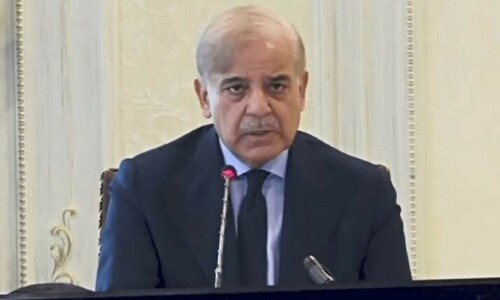FOSSIL fuels account for 90 per cent of global carbon emissions. The UN Climate Conference in Dubai last year took a decision to ‘transition away’ from fossil fuels to protect the planet from their detrimental impact. Given the reliance of the world economy on oil, gas, and coal — mostly energy production — this was not an easy decision.
Fossil fuels have played a key role in economic development by propelling the engines and wheels of industrial revolution. Unfettered access to natural resources and unrestrained extraction and use of fossil fuels by wealthy economies enabled them to reach the heights of development at a fast pace in a relatively short period. But this development came at a heavy cost to the planet and its people. Carbon dioxide and methane emitted during extraction and burning of fossil fuels have badly damaged the planet’s ecosystems, wreaking havoc especially in countries that are not historically responsible for greenhouse gas (GHG) emissions.
In climate talks, the need to move away from fossil fuels has been accepted for some time. However, a common approach on how to embark on a pathway which reduces their adverse impacts eluded agreement. Rich industrialised nations favoured restricting the continued use of hydrocarbons and quickly switching to renewable forms of energy. Developing countries supported a more cautious and incremental approach to ensure their economic development is not compromised.
The Glasgow Climate meeting in 2021 broke the ice when it called for a ‘phase-down’ of fossil fuels, but fell short of providing a clear roadmap. The decision to ‘transition away’ from fossil fuels is significant. It signals a move by nations to take a pragmatic look at energy production beyond oil, gas, and coal. It will help climate action, reduce pollution and create jobs if undertaken in an orderly and equitable way. To facilitate the transition, it was decided to take steps by “tripling renewable energy capacity globally” and “accelerating efforts towards the phase-down of unabated coal power”.
Is the world ready to move towards clean energy?
But, is the world ready to make this transition? What are the possible barriers and enablers?
Today’s global energy mix remains heavily skewed in favour of fossil fuels, producing about 80 per cent of world energy. While there are no two views anymore on the imperative to wean off from fossil fuels, switching to renewable energy is hugely expensive. For developing nations, all highly dependent on fossil fuels, the paucity of international and national public finance for clean energy is a major barrier.
Due to structural challenges, fiscal constraints and policy obstacles, the vast potential for solar, wind and hydropower in Asia and Africa begs exploration at scale to make a difference in lives. About 670 million people, mostly in the least developed countries, still live without access to electricity. Overall investment in clean energy has increased by 40pc since 2020, as recently reported by the International Energy Agency (IEA). However, its distribution across regions is uneven. Developing and emerging economies, home to almost half of the world population, received just 16pc of global investments in renewable energy last year. A report by the International Renewable Energy Agency reveals that Africa’s share in global investments in renewables in the last two decades was a mere 2pc. Almost 40pc per cent of Africa’s population has no access to electricity.
By the IEA’s assessment, investments in these economies will need to be scaled up more than five times by 2030, as “the key to an orderly transition is to scale up investment in all aspects of a clean energy system”. The inequality between and among regions and countries can delay a just transition.
Among other barriers, the IEA identifies “high costs of capital, limited fiscal space for government support and challenging business environments” which inhibit the ambition and efforts of developing nations to expand their renewable energy infrastructures. In contrast, industrialised economies are moving in the right direction by rapidly expanding their renewable energy systems. In Europe, for example, fossil fuel electricity generation is declining as wind power and other renewables gain ground. In 2023, the ratio of electricity generated by fossil fuels in Europe fell by 19pc. These measures will contribute towards reducing GHG emissions.
Realising the global goals on climate will, however, require stronger multilateral support and renewed collaborative endeavours and partnerships across all regions. A level playing field for developing and emerging economies will be a key enabler of a just, orderly, and equitable energy transition.
The writer is director of intergovernmental affairs, United Nations Environment Programme.
Published in Dawn, February 17th, 2024












































Dear visitor, the comments section is undergoing an overhaul and will return soon.